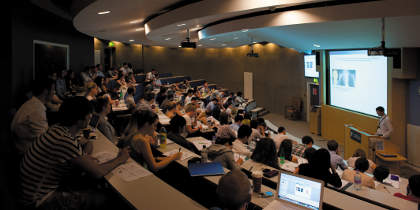
June 30, 2002, by Teaching at Nottingham
Supporting a student with Asperger’s syndrome
Lucy Sargisson: “As former Director of Studies and Chair of Student Affairs Committee and Student/Staff Consultative Committee (SSCC), I had the responsibility of monitoring the pastoral care and well-being of all of our students and it is in this capacity that I can offer knowledge and information about supporting a particular student with Asperger’s Syndrome. I can also explain the steps taken by the school to ensure that G had the best possible academic experience. I should like to stress that this is my own personal (rather than an official School) account.
Making adjustments
“G came to us with A’s at A level and the particular challenges that faced us concerned structural delivery of teaching and social interaction. In the early days, G found two-way social interaction very difficult and stressful and was inclined to dramatic outbreaks of frustration. We arranged one-to-one tuition and this worked well. Tutors soon realised that the usual signals of non-verbal communication were not appropriate and developed direct ways of verbally communicating with G. He is a voracious reader and his capacity to retain and understand complex texts has impressed everyone who has contact with him. He has strong political views, particularly on exclusion in education, and his early undergraduate work, though brilliant, tended to be somewhat dogmatic. His written work was always long: I believe his undergraduate dissertation was a quarter of a million words.
“With regards to social integration, G attended lectures with his peers, was allocated a special (non-medical) student helper, and was on the School’s SSCC. He was also a member of the Politics Society. As an Undergraduate student he represented his year on the Student/Staff Consultative Committee and chairing these early sessions was a real challenge as he could not pick up the cues that it was time to stop talking and allow someone else space to speak.
“I am aware that certain direct and indirect costs were involved in teaching G but am not in a position to fully recount these. Direct financial costs involved daily taxi fares to and from home, paying the non-medical helpers, and special photocopying arrangements so that he could access the core reading for his courses. Indirect costs would be such things as staff time (the decision not to enforce a strict word limit had implications in this respect). G graduated with an excellent degree and is currently doing research.
Staff feelings and observations
“As a postgraduate student, G is a valued member of our School. He fully participates in putting questions to visiting speakers in Research Seminars. These sessions require sensitive chairing as he has in the past stepped over the line of acceptable criticism and been quite rude to speakers.
“It is my observation that he has matured in his time here. He is quite relaxed in conversation. He recently gave a paper at our School’s Graduate Colloquium and I was impressed not only by the standard of his work but also by the gentle and generous way in which he handled questions from other students and staff. I do not mean to imply that his behaviour no longer reflects Asperger’s syndrome. His behaviour is, and always has been, unusual: in Research Seminars, for instance, he usually sits by the door, rarely removes his coat and has a small toy that he manipulates in his hands as he listens. He is phobic about flying things and if there is a fly or wasp in the room he will rush out, terrified. By saying that he has matured, I intend to convey that a softer edge has developed as he has gained social confidence. He will interact now, he is friendly and will take verbal cues. We have learned to work with him and he is truly liked and respected by my colleagues and myself.”
Article on flexibility in learning support, originally published in: Herrington, M. and D. Simpson, Eds (2002) Making Reasonable Adjustments with Disabled Students in Higher Education (pdf, 1.43Mb). Produced June 2002.
Prof Lucy Sargisson
Associate Professor, Faculty of Social Sciences
School of Politics & International Relations
No comments yet, fill out a comment to be the first

Leave a Reply